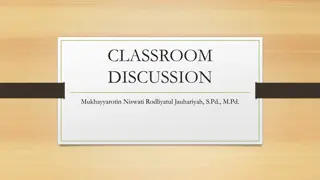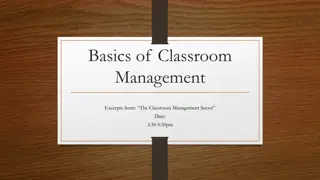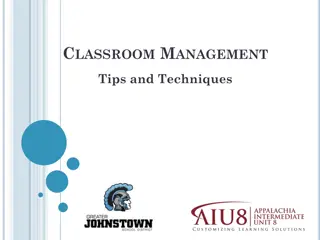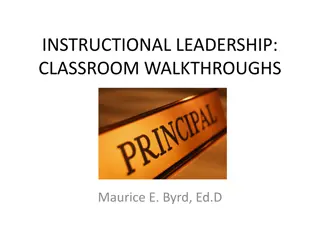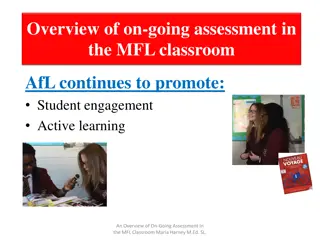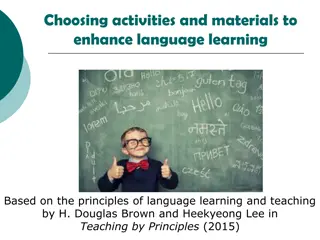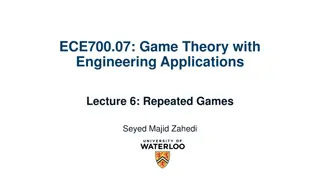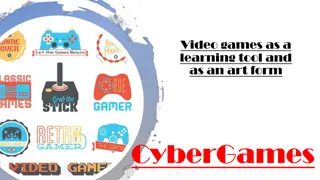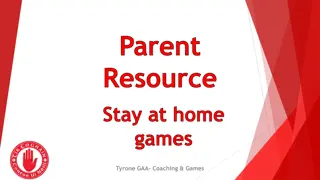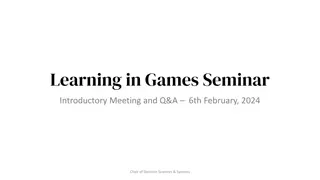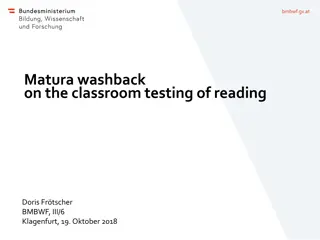Maximizing Language Learning Through Classroom Games
Engage students in language learning with the use of games to facilitate communication, critical thinking, and skill development. Games encourage active participation, repetition, and autonomy, fostering a fun and effective learning environment.
Download Presentation

Please find below an Image/Link to download the presentation.
The content on the website is provided AS IS for your information and personal use only. It may not be sold, licensed, or shared on other websites without obtaining consent from the author. Download presentation by click this link. If you encounter any issues during the download, it is possible that the publisher has removed the file from their server.
E N D
Presentation Transcript
Rhoda Pennington Confucius Classroom Manager and Mandarin Teacher Highgate Primary School rpennington2.309@lgflmail.org Teaching Blog: highgateprimarymandarin.edublogs.org
Game playing in the Primary Classroom Mandarin Teaching in Primary and Secondary Schools
A game is: a form of play or sport, especially a competitive one, played according to rules and decided by skill, strength or luck. A language game in the classroom: should give students the chance to practice and extend their language skills. It may or may not be competitive.
Group Brainstorm Consider why games have value in the Primary Language Classroom
We use games in language teaching because they make lessons engaging naturally encourage the positive involvement of even the most shy or reluctant learners force learners to communicate using target language (TL) for a meaningful purpose stimulate higher order thinking encourage the spontaneous and creative use of language can be used to teach all 4 skills: listening, speaking, reading and writing
More reasons to use games Games include repetition in a fun format Good for quick bursts of revision Can involve movement (aids learning and helps with restlessness) Build teacher-student bond and student- student bonds Encourage learner autonomy - student centred, teacher is facilitator
Planning the right game When designing a game, think about the learning objective and make sure your game type enables the learners to meet the objective Then decide which skill(s) you wish your learners to practice. Design your game accordingly.
Design your game so that adult guidance or peer collaboration moves the learners into the dark blue shaded area
Build progression by designing games for a sequence of lessons With each new language topic, make sure your games follow the following order of skill type (4-6 can be done in any order) 1. Listening drills followed by simple games to introduce new language 2. Listening games to consolidate new language 3. Easy speaking games 4. More demanding speaking games 5. Reading games 6. Writing games
Guidelines for designing a game Skill level should be just beyond what the average student can manage on their own More than just fun Involve all children at all times Encourage children to focus on the use of language rather than on the language itself Give students chance to learn, practice, review or manipulate specific language material
Success and avoiding feelings of failure Design your game so that everyone feels success as much as possible Find the right overall level of game for the learners Differentiate the challenge level within the game for different abilities Avoid individuals competing against individuals No need to make a big deal about who is the winner
Target Language in Games Games should be played using only Mandarin, even when giving instructions and point scoring (applies to teachers and students) In a competitive game, deduct points if a player uses English to communicate Teach the necessary instructional and game- play language
Brainstorm With someone sitting near you, note down the types of words and phrases you will need to teach for game playing
Gentle games and friendly competition Reception, KS1 and lower KS2 Children vs teacher rather than children vs children Mainly whole class games, or if in groups, adult guidance will be needed for many games Non-competitive games work well Build a supportive classroom environment Start with 3 words for 4 year olds, and up to 6 words for older children. Only add more if they can handle it
Groups and teams Whole class divided into 2 or 3 teams (highly competitive and can be very motivating, but be careful - some students may be passengers ) Pair work: fast and easy to organise Group work: arrange mixed ability groups if they are competing against one another Pick your groups carefully, considering group dynamics
What about mistakes? Mistakes are part of language learning The biggest mistake would be a child not participating for fear of getting something wrong Build a supportive classroom by laying down strict rules about how children interact with one another, especially when playing games
The teachers role In whole class team games, teacher can be the umpire, although this role can also be given to a child In group/pairs games, teacher circulates around groups, or works with a group
Whole class games to play with songs/ rhymes (all ages): listening & speaking Instruct children to omit a certain word A child conducts the song using their arms to indicate and and uses instructions in Mandarin to tell the children to Sing the song to a different but familiar tune
Whole class games with songs and rhymes (all ages): reading Teacher points to Mandarin lyrics whilst children sing. When teacher stops, children stop (low level of challenge) Teacher sings with children and Mandarin lyrics are displayed. When teacher stops, children independently identify where they have reached on the text (high level of challenge)
Further games (all ages) Matching or sorting games with objects/flashcards (pairs) Mini board games / dice games (groups/pairs) Prediction games with objects / large flashcards : (whole class) Role plays (groups/pairs) Physical games using the whole classroom/playground (whole class)
Further games for KS2 Games with flashcards (easily printed off from Quizlet) Games using digital learning platforms (e.g. Quizlet, Kahoot) (whole class/ pairs/individuals) Role-play games / mini-dramas (groups/pairs) For a huge variety of games practising all four skills see ESL Game: 176 English Language Games for Children by Shelley Ann Vernon
Display games on your IWB and let the children get on with it in pairs. Provide mini flashcards printed from Quizlet Simple matching, Mandarin to English (second time:race) One player removes a picture card. The other identifies what is missing and says it in Mandarin Pelmanism: turn cards over and take turns to find matching pairs. If it matches, say If not.. Snap: when you have a snap, say Invent your own game
Online games http://www.bbc.co.uk/schools/primarylanguages/mandarin / It would be possible to design a beginner curriculum around the topics covered in this very accessible website. Quizlet flashcards (online games and printable lists for creating your own mini-flashcards to use in games) https://quizlet.com/117673685/food-and-drink-yct-1-flash- cards/ Quizlet live interactive whole class game. Access for players: www.quizlet.com and select Quizlet Live https://quizlet.com/117673685/live Kahoot (Kahoot.com) Access for players Kahoot.it https://play.kahoot.it/#/gameblock?quizId=118b23dd-53dd- 4013-9847-07b6663027df
The value of role plays Acting removes inhibitions Children are using language for a real purpose Prospect of performance encourages children to rehearse and improve Opportunity to video and analyse Rehearsing includes repetition Learner autonomy Learner creativity Mixed ability groups very effective in role play
Some final tips Choose calm / excitable games to suit the class, time of day, stage in the lesson Start with easy games, build to harder Cultivate team spirit Use resources you have to hand (body parts / furniture/classroom props) Make sure children aren t waiting long for a turn
More final tips Have reserve material ready in case a game doesn t go well Always stop the game whilst everyone is still enjoying it Use short games frequently to revise topics Surprise your class with a new routine Good luck and have fun!
Sharing Opportunity Which games have worked well in your teaching? Please share your experiences with the group.






